Estimated reading time: 7 minutes
When you get your first little clutch of chickens, you want to be able to enjoy them to the fullest, so having everything ready before your new peepers arrive is essential.
Your chickens will do a very good job taking care of themselves, as long as you lay the foundation for them to have a healthy and happy life. Providing your flock with the basic necessities will allow them to settle into their new home with ease.
Want to save this post for later? Click Here to Pin It on Pinterest!
Before you bring your new chickens home (whether they are chicks or adult chickens) you should have the following items ready to go:
1. Founts and Feeders
A good water fount doesn’t seem like a big deal, but chickens love to scratch at the earth or bedding, and unfortunately, it usually ends up in their water dishes. Simple pans or old bowls are just not sufficient when it comes to providing containment for food and water. If waste and bedding, or even dirt, gets scratched into your chickens' food and water, it can foster bacteria and cause health issues.
Look for water founts that are rounded on top so your chickens will not be able to roost on them…because where chickens roost is where they poo. Most chicken founts are created to be auto-filling, so as your chickens drink the water in the fount, more fresh water fills the reservoirs.
When looking for a good feeder, look for feeders that have a rotating bar in the middle of them, this also keeps chickens from roosting on their food or sitting in it. Chickens will roost wherever they can, so preventing them from being able to roost on their feed dishes will go a long way.
2. The Chicken Coop
The coop you decide on will relate directly to the amount, and size, of chickens you will have. Some of the easiest and most efficient chicken coops are pre-built and can be delivered directly to your door. Though, I do prefer to always build my own and have built countless chicken coops. I use free chicken coop plans to tailor them to my liking.
When selecting a coop, be sure to read the dimensions in the description and make sure that each bird has at least two to three square feet per bird. If you want to avoid harmful chemicals, also look for coops that do not have wood that has been treated.
If the coop you are considering has a roost, even better. Built-in roosts are usually placed strategically so that chickens will not be roosting over the top of their food and water. If your chosen coop does not have one, you can also buy them separately and easily install them later.
3. Bedding
When preparing for the arrival of your chickens, selecting the perfect bedding is extremely important. If you will be bringing home baby chicks, consider using something soft that retains warmth like pine shavings. Shavings are also great to use for chickens’ entire lives, but always be sure to change it regularly, or if using the deep litter method, add more when needed to prevent odors, bacteria growth, and mold.
Other types of bedding that chickens love are straw, sand, and recycled paper. These can be effective alternatives to shavings, but will each require their own special attention.
4. Grit
Chickens must have access to grit in order to digest their food properly. Even as baby chicks, grit should be provided with their food to promote proper digestion and to prevent impacted crops.
You can find poultry grit that has added probiotics, which also helps aid digestion. Bags of grit will typically indicate if it was produced for layers, chicks, or meat birds. Usually, these differences are minor, but there may be small benefits added to suit the population it is serving.
5. Diatomaceous Earth
Diatomaceous Earth is a preventative product all chicken owners should have on hand for their flock. As you begin to observe your friendly flock, you will notice that they love to take dust baths. At first, it can seem as though they are injured while flopping around in your flower garden, but your chickens are actually taking a bath to prevent or rid themselves of mites or lice.
Having food grade diatomaceous earth on hand will aid in the prevention and treatment of external parasites. It is made from iron oxide, silica, and clay that is derived from fossil remains. These natural properties repel unwanted pests from your flock.
Diatomaceous earth can be sprinkled in your coop, your chickens favorite bathing area, and even directly on your chickens. It’s perfectly safe and your chickens will love the luxurious treatment.
6. Nesting Boxes
If you don’t want your eggs scattered all over the coop, nesting boxes are a must-have for all chicken owners. Hens like to lay eggs in safe, enclosed, and warm spaces. If you don’t provide this for them, they will look for it elsewhere, and it usually just-so-happens that “elsewhere” is either out of reach or hidden from you.
Nesting boxes come in a variety of shapes, sizes, and materials. You can find plastic nesting boxes, nesting boxes that have built-in shelves to prevent egg eating, and even multi-nesting box shelves. The options are endless, so don’t let it overwhelm you when picking out your ladies' boxes.
One nesting box per four to five hens will usually do, and as long as your hen feels safe, and has some privacy, it will probably become her favorite place to lay her eggs.
7. Food
Last, but not least, you will need to have the appropriate feed on hand for your new flock before they arrive. If you have young chicks arriving by mail, they will be thirsty and hungry, so purchase chick starter feed (medicated or non-medicated) to have at the ready.
If you will be hosting layers, make sure to provide them with layer feed, which will provide some of the vitamins and minerals needed for chickens to produce strong, healthy, eggs.
On the other hand, if you are raising birds for meat, be sure to buy feed that is specifically created for meat birds because it will provide them with the protein they need to support their fast-growing bodies.
I am a huge proponent of free-ranging chickens. I like to know the main protein source is insects of all sorts that they peck and scratch for all day. I have reached a point where I do not have to refill food in my feeders because they prefer free-ranging and finding their own food. This gives me peace of mind with eating natural eggs and also natural meat.
I also always encourage chicken owners to have a garden and let nature go full circle. I feed my chickens garden scraps and at season start and end I let them till my garden by scratching and digging. During gardening season I use their manure and complete the natural cycle of fertilization and I reap the benefits.
If you are ready for your chickens before they arrive, you can spend your time enjoying them rather than making last-minute runs to the store for something you didn’t have on hand. These basics will set the stage for a happy, healthy, flock, and they will repay you with hours of entertainment, and delicious breakfast eggs.
If you are still unsure what breed of chicken you want to purchase be sure to stop by The Happy Chicken Coop for the ultimate guide to chicken breeds.
Like this post? Don't forget to Pin It on Pinterest!


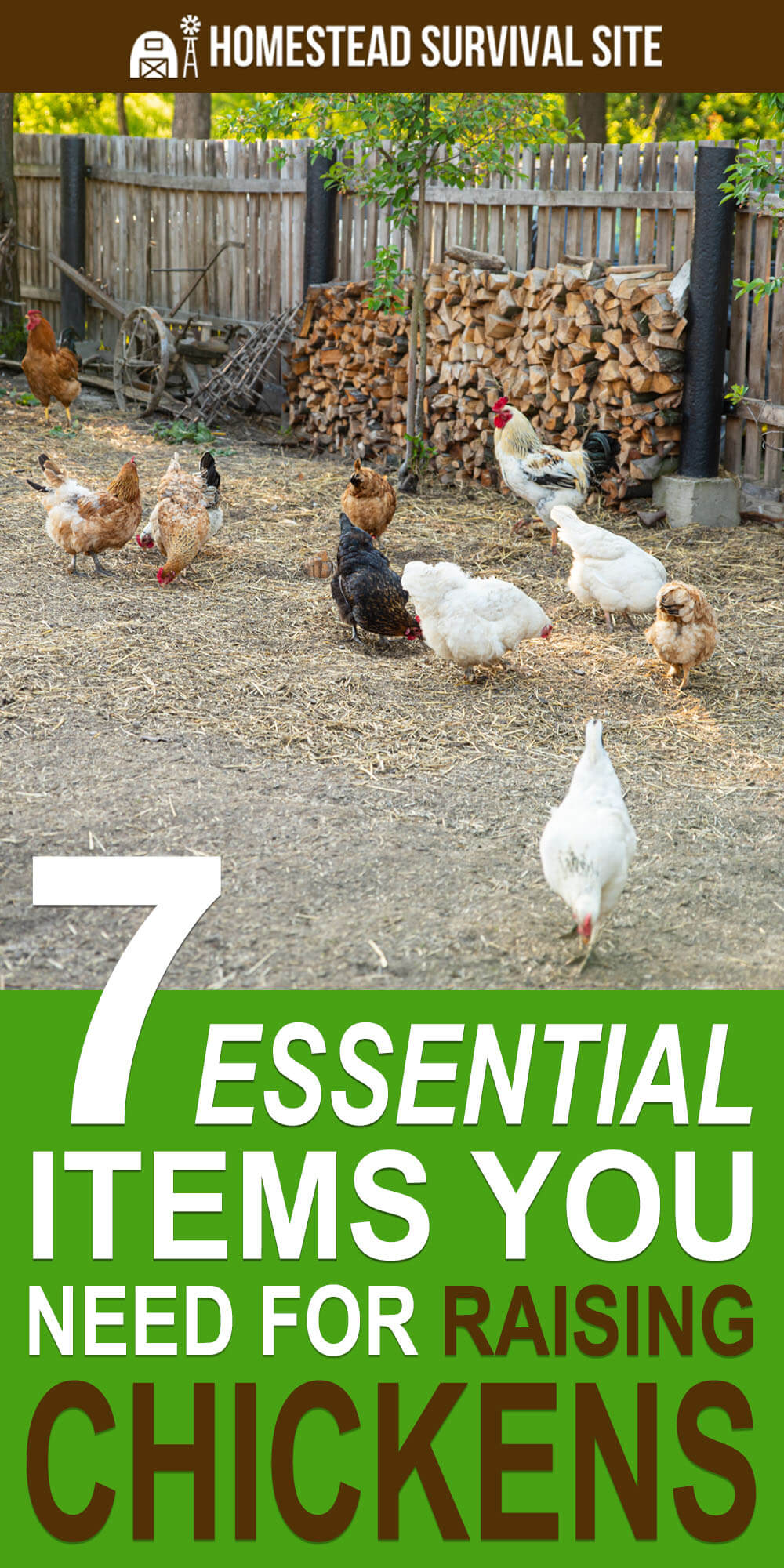
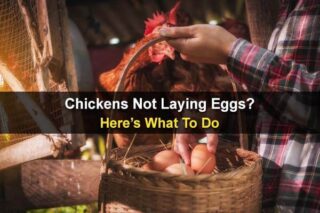
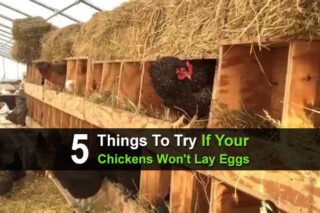
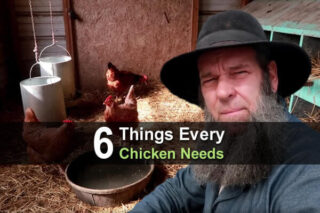
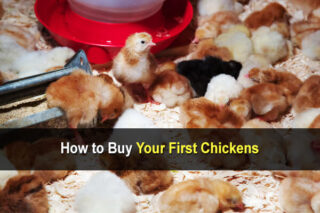
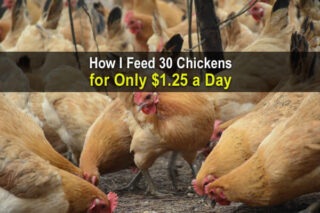


Thank you so much for this article on ‘7 things chickens must have’.Twenty years ago we moved from city apartment dwelling to a beautiful valley surrounded by mountains on all sides, and farmers still plant, raise cattle, own horses, and old pioneer cabins from the 1800’s still stand on original land grants families passed on.
So, here we are, in awe of the beauty, but dumber than dumb about farming and raising anything in nature. Our first pets: chickens. Nothing beats free ranging hens eggs. We learned quick about circling Hawks, egg-binding, and health issues of our flocks and still have our first hen now 18+ years-old. We’re still learning and your articles are very helpful–right-up our alley (I mean pasture) Thanks again for you insight.
Glad you liked it! This article was a guest post from TheHappyChickenCoop.com. If you’re new to chickens, you should definitely check it out.
This web site is so good